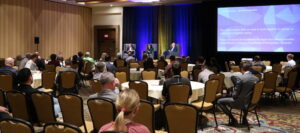
Economy and awards highlight CCA Day 2
By Adam Freill
Commercial Construction Industrial Infrastructure Institutional Labour Leadership Skills Development SoftwareCanada’s construction sector is facing an uncertain period in 2023 and 2024, but there will be opportunities, possibly enabled by technology.

CEO Roundtable, from left, CCA president Mary Van Buren, Tooey Courtemanche, president and CEO of Procore, and Silvy Wright, CEO of Northbridge Insurance. (Photo by On-Site Staff)
Labour shortages, supply chain uncertainty and inflation were all core topics of discussion during Day 2 of the Canadian Construction Association’s 2023 annual conference, held at the El Conquistador Tucson resort in Arizona.
“I think we can all agree, there is a lot of uncertainty as we predict 2023 and 2024,” stated Silvy Wright, CEO of Northbridge Insurance during the CEO Roundtable featuring CCA president Mary Van Buren and Tooey Courtemanche, president and CEO of Procore.
Wright explained that after two very strong years with GDP grown of around four per cent, a dip to growth of 1.5 per cent has recession at the fore of many people’s minds.
“A strong economy is good for construction. It’s good for governments, it’s good for all of us. So where is it going with regards to 2023? Well, there are two things that we are watching: interest rates and inflation, which really go hand in hand.”
She pointed to Canada being the only G7 nation with a growing population, adding that the low unemployment rate will help temper any potential recession since people who are working will have spending power needed to keep the economy moving.
“I think in Canada we’re very lucky. We’re very fortunate. I think Canada is very stable,” she said.
Looking at construction challenges, Courtemanche explained, “Your challenges are not unique to Canada.”
In his discussions with executives in the sector, he said that labour shortages and inflation are making for a more difficult business environment, but added that sites are active and opportunities for growth exist.
“I always ask in my calls, ‘How are your backlogs?’ and the across the board, they’ve remained very strong and healthy,” he said. “So there’s a little bit of cognitive dissonance that happens. If you read the news about all the stuff that’s happening, it sounds awful, but these folks are running their businesses, and they’re seeing that there are still areas of opportunity.
“Ultimately, there seems to be a fair amount of optimism about the future.”
Of course, there are still the day-to-day challenges, and the need to mitigate risks of all kinds.
“When we when looked at the construction segment, the number one claim in terms of count is theft,” stated Wright. “And you’re saying well why is it on the rise? Well supply chain issues make things very valuable.”
Much as technology can help with jobsite productivity, new devices are also helping reduce risk on sites, from $10 tags to track items to Internet of Things (IoT) devices that can reduce potential damage to a building under construction.
“On the dollar front, the two top claims are fire and water damage,” she said. “On the water side, we’re seeing that mainly on high-rise buildings towards the end of a project, and when that happens it is pretty severe.”
Her company, in partnership with a builder and developer, has explored the use of an IoT enabled device that can shut off the water valves if a leak is detected. “That’s really reduced the severity of the losses.”
She also cited such technology as cameras mounted on hard hats that can scan sites and improve safety.
“We’ve come a long way as an industry,” added Courtemanche. He recalled the early days of Procore when he would have to install digital equipment himself since sites were not connected to the internet. “Today, you’re talking about people walking around with high-tech enabled hardware in order to build better.”
Not only does technology open the door to safer and more productive jobsites, but it is also one of the keys to attracting young people to the construction sector, explained Courtemanche.
“The young folks that are coming out of university now, they expect modern technology to be the tools that they use to get their job done, because they’ve only grown up with things that are very usable like Facebook and Instagram,” he explained, adding that forward-thinking companies with modern equipment have a leg up in a competitive job market.
Another source of new workers, immigration, was the theme of another business session as a panel discussed the need to change Canada’s outdated immigration policies.

Discussing Canada’s immigration policies, and how to improve them to help the construction sector. (Photo by On-Site Staff)
Attendees were told that in the global competition for workers from other countries, Canada’s system, which can be long and cumbersome, is not helping overcome the challenge of attracting these potential immigrants to a country that is seen by many outsiders as friendly, but too cold and expensive to relocate to.
“Prioritizing educational certifications does not help the construction sector,” explained Patrick McManus, executive director of the Ontario Sewer and Watermain Construction Association.
He illustrated some of the challenges that work against the construction industry’s labour needs, including the use of a scoring system that does not prioritize applicants who may match the needs of construction companies. His advice: “Give the provinces more say in the who they are bringing in.”
The annual awards luncheon was an opportunity for the association to recognize some of the best and brightest in Canada’s construction sector. For example, innovation award winner Coffrages Synergy developed an app for its own employees, allowing them to keep connected and updated, and the company has now made the app available to the construction community at large.
“The app is about belonging to something bigger than ourselves,” stated Isabelle Cote, the company’s CEO. “We need to make sure that construction will be the best place to work.”
And doing more for the community was also a strong theme at this year’s awards.
“One of our guiding values is ‘Helping build enduring communities together,’” said Brad Tangjerd, business development manager at NorLand Limited, winner of the corporate community leader award, adding, “and that’s not just something that’s written on the wall of our offices.”
The full list of awards winners is included below:
CCA 2023 Awards
- Gold Seal Award
- Jancon Construction Ltd.
- Community Leader – Company
- NorLand Limited
- Community Leader – Individual
- Russell Grass Sr.
- Partner Association Award
- Association de la construction du Quebec
- Environmental Achievement Award
- Ledcor Highway Maintenance
- National Safety Award
- NorLand Limited
- Workforce Excellence
- Marco Group
- Young Leader
- Victoria Stanhope
- Young Leader Honourable Mention
- Ryan Davis of Marco Group
- Innovation Award
- Coffrages Synergy




